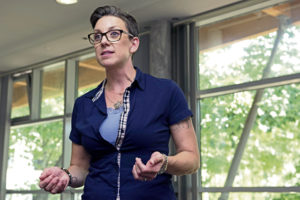
Now more than ever discussions about race and diversity are important. The U.S. Air Force is not excluded from the current climate, as senior leaders such as former Chief Master Sgt. of the Air Force Kaleth O. Wright and former Chief of Staff of the Air Force Gen. David L. Goldfein led the charge in encouraging racial sensitivity.
“While we can’t change the world, we can change the communities we live in and more importantly, those where our Airmen strive to be seen, heard and treated as human beings,” Wright wrote in a June 1 essay following the death of George Floyd, a Minnesota man who passed away May 25 during an arrest by Minneapolis police.
Inevitably, the conversation trickled down to Ramstein Air Base as well. The death of George Floyd sparked questions about how to move forward and help the community.
When those questions are asked, the 86th Airlift Wing Equal Opportunity office is there to answer them. The mission of the EO office is to enable combat airlift capabilities and total team excellence through exceptional equal opportunity service, unrivaled leadership support, and promotion of a positive human relations environment. That mission has become more important than ever in recent months.
On May 26, the day after Floyd’s death, the phones in the EO office rang nonstop, recalled Senior Master Sgt. Carlos Cervantes, 86th AW EO deputy director. Rank didn’t matter here. Calls from junior enlisted Airmen to first sergeants to higher officers were received constantly.
”We were seeing more individuals coming forward, not necessarily to file a complaint but wanting to do something and make more effective change,” Cervantes said.
Soon after, the small EO agency of seven personnel came together to have a discussion on how to proceed.
”We knew as a small team, we’re not going to be able to reach every Airman on base,” Cervantes said. “Our plan was to get behind leadership rather quickly and provide them the resources so that they (could) engage with our Airmen.”
The solution came in the form of two classes, the first of which was called “The Power of Facilitation: Talking about Race.” The course provided leaders with the right tools for creating a safe environment for their unit to have discussions about race.
”We realized that most individuals would probably go into this conversation very hastily,” Cervantes said. “And without the experience of facilitation, it can be a quick conversation. But it’s not about that. It’s about empathetic listening.”

The course was established in early June, and has been highly successful so far, with over 150 key leaders participating in the training course.
Their next course is called, “Unconscious Bias: Understanding Bias to Unleash Potential.” This is a class from an outside training agency that aims to teach others about biases they may not be aware of, and how to counter those biases to become better decision makers.
”Everybody forgets a good briefing, but everyone remembers an experience,” Cervantes said. “That’s what we hope to bring up with unconscious bias.”
The class is currently being tested, and will first be taught to senior leaders and high-risk units, Cervantes said. The EO office is hoping to bring the class to the general public in late August.
However, in the long run, learning racial sensitivity is up to individuals. The key for people to realize when it comes to being more inclusive is that we all have biases, Cervantes said.
”This is not just an Airman (issue),” Cervantes said. “This transcends race, gender and rank. This is a human element. We have a natural tendency to quickly make snap judgements. So the very first step is identifying that.”
Once people come to that realization, the next step is for people to listen to others, a term Cervantes referred to as “empathetic listening,” or listening with no agenda involved. Talking to people around you, understanding who they are and where they come from could be helpful in keeping biases at bay.
“A lot of those biases we have are based in our socialization,” Cervantes said. “We are all socialized differently. No Airman is going to be like you. It’s quick to make judgements and act on those judgements, but in order to make the best decisions, use empathetic listening to try to better understand the situation.”
While the work of the EO office has always been important, Cervantes said he noticed people have been more appreciative of their work in recent months.
“Part of our mission statement talks about providing unrivaled leadership support,” Cervantes said. “So to see the responses we’re getting and the interest really makes us feel valued. It’s a pleasure for us to work in this capacity.”
The work never stops for the Ramstein Equal Opportunity office, and while it does put a strain on the small unit, the team is more than ready for the task.
”It’s an understatement to say that we are busy,” Cervantes said. “But the more we can respond to this on the prevention side, the more we can mitigate (problems) down the road. This is where we find our (purpose).”


